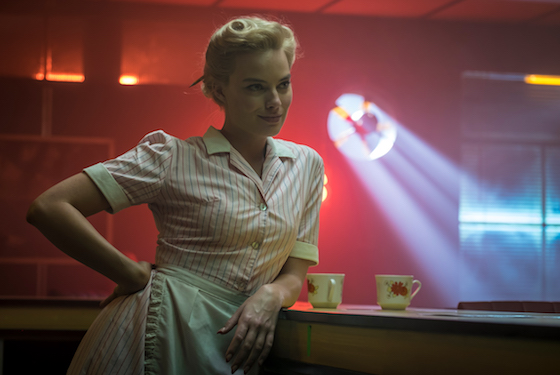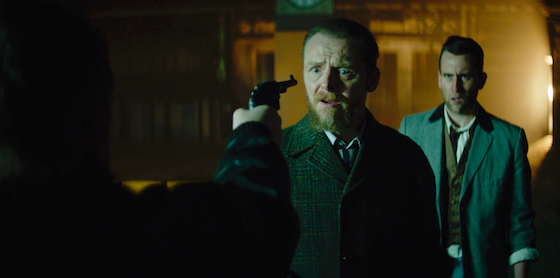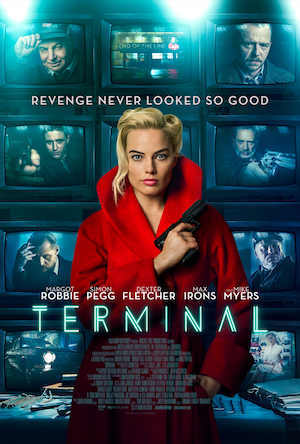 [Rating: Minor Rock Fist Down]
[Rating: Minor Rock Fist Down]
A film-noir mystery yarn that unspools with the uninspired pluck of a used car dealership commercial, Terminal, which opens Friday, is just that: a prognosis of gloomy portent. A needlessly convoluted attempt at puzzle filmmaking, the movie sets up its own mysteries right out of the blocks, only to then lead its audience through every reveal like a tour guide shepherding a Kindergarten class. The end result is a series of “Gotcha!” moments that carry little weight and serve no real purpose except to spice up a story that would come off as pedestrian on a daytime soap.
Ripping a page out of Robert Rodriguez’s Sin City playbook, Terminal takes place in a fictitious alternate reality noir-scape full of neon lights, steam vents, assassins, and polished grime. A train terminal serves as the film’s primary location, where the main characters either work or pass through. There’s the mysterious traveler, Bill (Simon Pegg), the sultry station café waitress, Annie (Margot Robbie), the terminal’s janitor (Mike Myers), and a pair of hit men: Vince (Dexter Fletcher) and Alfred (Max Irons).
Terminal uses time jumps to establish these characters within a broader narrative about contract killings and revenge as orchestrated by a mysterious underworld figure that watches all these stories play out over CCTV. All of this is in service to a central mystery that’s little more than a two-dimensional question about who these characters are, and where they come from. The lead-up questions baked into the script don’t serve the larger story or character development, but rather exist solely as garnish to a grand mystery which itself has only a passing connection to all that comes before.
 Making matters worse, none of it is very well thought out, and little of it makes much sense. Taking a step back from it all to look at the story from a distance, the end result of Terminal could just as easily have happened without any contributions from its sub-plots, making everything that transpires through the first 95% of the picture essentially meaningless. The result is a film that is little more than a beautifully shot, well-acted noir exercise that lacks the stakes and impactful narrative foundation crucial to the genre.
Making matters worse, none of it is very well thought out, and little of it makes much sense. Taking a step back from it all to look at the story from a distance, the end result of Terminal could just as easily have happened without any contributions from its sub-plots, making everything that transpires through the first 95% of the picture essentially meaningless. The result is a film that is little more than a beautifully shot, well-acted noir exercise that lacks the stakes and impactful narrative foundation crucial to the genre.
Director Vaughn Stein is making his feature debut with Terminal, which he also wrote, yet the guy is no rookie. He’s done 2nd Unit or 3rd A.D. work on big budget projects like World War Z, In the Heart of the Sea, and The Danish Girl (to name just a few), and if Terminal has just one thing going for it, it is its looks. It is obvious that Stein knows how to set up a shot and put together a product that gives the impression of quality filmmaking, as his background might reasonably suggest. The lighting, set design, and scene composition are all striking, and give Terminal a distinctive feel, yet like the “mysteries” of the script, it is all for show and carries little weight.
The basic foundation of the film is also questionable, as there isn’t a reason why this story needs to take place in a hyper-realistic alt-reality landscape. The characters don’t exhibit any superhuman qualities, and the story doesn’t demand any fantastical stretches of physics, etc. Why, then, does the movie live in this world, other than the bold aesthetics?
 It’s a waste, really, because aside from the delicious visuals, the acting talent involved in the production is first rate. Pegg does fine work as the guarded, reticent Bill, who is at a crossroads in his life when he meets the mysterious café waitress, Annie. As Annie, Robbie goes all-in with the big grins, sultry over-the-shoulder looks, and devil-may-care attitude; she’s an electric presence on-screen, and her character is the only one the script allows any room to breathe. Her Annie character is even provided some backstory, yet again, she only exists in the picture to guide the audience through a series of reveals that are thrown at the audience’s feet like a wet, 50 lb. sack of potatoes (there’s no missing its landing).
It’s a waste, really, because aside from the delicious visuals, the acting talent involved in the production is first rate. Pegg does fine work as the guarded, reticent Bill, who is at a crossroads in his life when he meets the mysterious café waitress, Annie. As Annie, Robbie goes all-in with the big grins, sultry over-the-shoulder looks, and devil-may-care attitude; she’s an electric presence on-screen, and her character is the only one the script allows any room to breathe. Her Annie character is even provided some backstory, yet again, she only exists in the picture to guide the audience through a series of reveals that are thrown at the audience’s feet like a wet, 50 lb. sack of potatoes (there’s no missing its landing).
Fletcher and Irons also do decent work in the plot-fuel roles they are given, but again, they aren’t explored as real people, but rather as components to a larger story that could have easily proceeded without their involvement. Myers is among the best served by the script in the sparsely used Janitor role, which allows the comedian to do what he’s most adept at: doing silly voices and a cartoonish physical schtick. However, none of this work is enough to elevate the movie to anything resembling a successful execution of either the mystery thriller or noir tropes, which both lend their style (if not substance) to the confusing stew that is Terminal.
Who these characters are, what they want, and why they want it really isn’t established until the last 10 minutes of the picture, by which point it is hard to give even one, let alone two shits about any of this. Opening this week, Terminal just isn’t very good. Housing the look, feel, and story beats that point at a noir mystery thriller, Stein’s movie fails to capture any of the magic (or narrative elements) that propel these stories to greatness. If the movie had a prognosis, it would indeed be terminal.






Comments on this entry are closed.